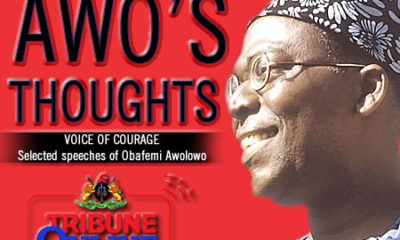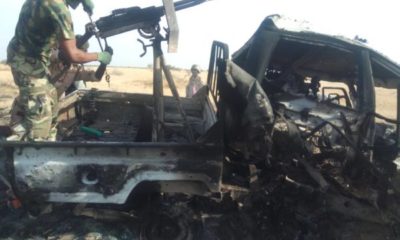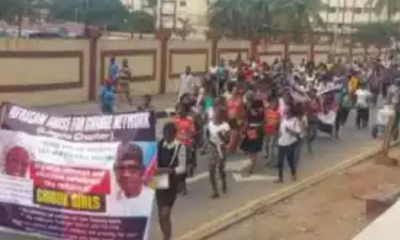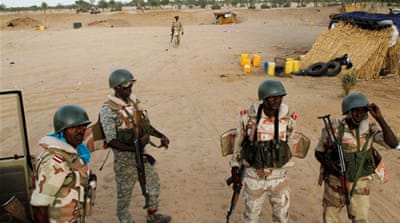Nigeria News
Boko Haram: A People’s Alternative To Peace
By Adewale Adeoye
Recently, tear-soaked Mrs. Deborah Shettima from Borno State gave a gory account of how her husband was killed, her two children seized and her only remaining child shot dead barely one year after the anniversary of the murder of the leader of Boko Haram, Yusuf Mohammed. The military authorities recently announced the death of 20 insurgents after a failed attempt to seize a military outpost in Borno State. The 20 people have relations, they probably have children and wives and maybe some of them are innocent. Nigeria is drifting into a state of blood. The situation may get even worse as the Nigerian neighbours in the Maghreb region grapple with faith-driven armed uprising. Unfortunately, Nigeria may suddenly become a hotbed of deep ethnic divisions and religious upheavals. For months, Nigeria has been characterised by bombings and mass killings, leading to thousands of internally displaced persons, including women and children. In our very eyes, the Afghanistanisation of Nigeria is spreading like a wildfire in the dry season. Predictably, this carnage will spread into the southern part of the country. The bombings in Kogi State, less than 10 minutes drive from some villages in Ekiti and Edo states, are clear indications that the Islamic movement may soon hit major cities in Southern Nigeria.
I have had opportunity to travel across the North, first as an active member of the National Association of Nigerian Students, NANS, in the 1980s. I have also been to the North as a member of the Technical Committee that organised the first modern ethnic summit in Northern Nigeria in 1999, at the instance of the late Dr. Beko Ransome-Kuti and also as a researcher on self-determination in Nigeria. The ethnic summit held in Jos drew close to 1,500 people. The bitter truth, however, is that the Boko Haram crisis will continue for certain reasons. One, the current Nigerian leadership lacks a deep historical understanding of the nature and form of the insurgence that is engulfing the country and, therefore, cannot provide an enduring solution.
Two, contrary to the propaganda of state security operatives and the sometimes deceitful and ignorant categorisation of the crisis as ad hoc, what we see is a well planned campaign of terror woven around primordial values. Unknown to many people in authority, the insurgents in the North appear to relish the support of a huge population of adherents, who are happy that at last, a group is giving it back to a state that for decades has treated her citizens like cockroaches on the sidewalk. Millions of poor people in the North are frustrated by a corrupt, inept and almost moribund political leadership. There is the belief, even if illusory, that the introduction of Sharia will curb the recklessness and spinelessness of the Northern political leaders. It means that with what clearly appears as the support of Boko Haram by a section of the local population, overall defeat of the Islamic movement is far-fetched. Thirdly, President Goodluck Jonathan had admitted that security operatives are involved in the execution of Boko Haram campaigns. This only confirms how difficult it will be to banish the sect. By now, we should fear for the personal safety of Mr. President and the violent ethnic backlash any harm on him foretells.
Here lies the peril that faces Africa’s most populous country. The most dangerous trend is that though the Federal Government appears to have scored “victories” through its superior armed confrontation with the sect, there are unforeseeable, dire consequences one of which is the fear that security operatives who are natives of communities under state sponsored siege, will naturally be displeased by the often innocent casualties that usually accompany military operations in their dominion. One thing is now certain: These bombings have become one of the major threats to stability in Nigeria and West Africa and given the country’s huge population, there is a visible threat to global security.
What should be done? There cannot be a solution to the crisis without understanding its history, nature and form. For one thing, it is completely naïve to cite the Islamic insurgence as mainly the product of the temporary loss of power by the Hausa-Fulani North. This only explains an aspect of the problem. It appears a section in the Presidency thinks this way when it linked the uprising to the assumption that “some people just don’t like’ the President’s face”. This is simplistic and will definitely lead to wrong solutions to a persistent problem. In understanding the current trend, we should know the history of the people waging this campaign. Let us reflect a bit on where they are coming from.
For over 300 centuries, the North-East has been home to Islamic re-insurgence, partly due to the region’s unique political and cultural history. We cannot appreciate this without understanding the Borno Empire and its historic fangs and timeless struggle for self-determination, which has been continuously stymied. The Borno dynasty had existed for over 1000 years, covering some parts of Ghana, Nguru, Kano and Adamawa states. Its collapse was only saved by Sheikh Muhammed al-Amin el-Kanemi, who was born in 1772. Borno had over the years resisted any external culture, influence or the creation of ‘national cultural identity’, which the modern Nigerian nation continues to fan. The Hausa, Fulani and the Borno pedigree are not the same and sometimes view each other with suspicion. For instance, the Fulani first entered the Borno capital, Ngazargamu, on Saturday 12 March 1804 (the 13th Muharram, 1223 A.H). Old Borno Empire (now Yobe, parts of Adamawa, and Borno states – the hotbeds of the insurgency) had always resented intruders and had meted harsh venom on such. As the Fulani came, the fleeing Mai Dunama appealed to el-Kanemi, who summoned his Kanembu tribesmen and the Shuwa Arabs, who rallied because they considered the liberation of the Saifawa Dynasty a noble cause. They considered the Fulani as mere aggressors and usurpers. After routing the Fulani, el-Kanemi returned Mai Dunama to his domain. The siege continued until after the death of Uthman dan Fodio in 1817.
By 1830, some terms of truce were declared in Sokoto and Kukawa in the 13th century. The prowess of Borno extended to the port of Kabara near Timbuktu, where Islamic groups were recently dislodged by the French and allied forces. Borno had made efforts to expand its purist Islamic norms to the other parts of Nigeria or the Northern hemisphere. For instance, in the autumn of 1825, Bornu army’s attempt to take over Kano was repelled by 124,000 Fulani soldiers, half of the number of soldiers deployed by Alaafin of Oyo to safeguard Yoruba territory almost a century earlier. The Borno army captured the Bauchi flag, while the Fulani soldiers also captured silver timbre. Realising the balance of forces, peace accord was signed at around the time the Nigerian nation began to emerge. In all the ancient battles, the Shuwa Arabs supported the el-Kanemi, known to be the direct descendant of the Holy Prophet Mohammed (SAW), through his mother.
There are historical reasons to suggest that the uprising may continue to receive unprecedented support from unlikely quarters in the Middle-East. The break-up of Boko Haram into factions appears to reflect the old rivalry between the North-West and the North-East, which has been explained earlier. It now appears that at least three extremist groups – the Ansarul Muslimina Fi Biladis Sudan, Boko Haram (Jamaa Ahlal-suunah Li-dawa wa al-Jihad) and other less known Islamic groups – have emerged in the North, each representing varying ideologies of Islam. In Zaria lay the prominence of the Shiite, which mystical root is Iran. There is now the obvious fear that apart from the ongoing confrontation with the state, intra-Islam insurgence, based on ideological cleavages, like in the case of Pakistan and Iraq, is not unlikely in the future. This portends serious danger for the conservative caliphate which has been holding on to power since 1804 to the disadvantage of the poor, impoverished masses.
Viewed critically, Boko Haram is a radical, revolutionary Islamic movement that is questioning orthodox political and economic traditions in Nigeria, but which is most proclaimed in the North where political leaders literally feed on the misery of the people. Today, Boko Haram appears to be exploring the deep-seated poverty in the North, the public distrust of the authorities and the ethnic cleavages in Nigeria to strengthen its recruitment base. Ab initio, the group may have started as a front for politicians seeking political power, the reality now is that it has assumed the status of a cultural and religious movement capable of drawing sympathy from an angry and disenchanted Northern Muslim audience, and of course with great potentials of drumming huge support from millions of angry and hungry people spread across the Maghreb region where the exclusion from economic and political contest has been their lot.
There have been harsh criticisms of the group for its campaign of violence and blood, with some describing the group as a bunch of anarchists. These criticisms sometimes come with blind rage that it often makes constructive engagement difficult to conceive and suggesting that a solution would only come when the group has been exterminated. To me, the group appears to be genuinely driven by the philosophy of an Islamic theocratic state. If that was not its initial intention, it has nevertheless assumed this status. The group is ferociously committed to overthrowing the government of Nigeria in all the territories where its influence is strong enough. Though the group wants the Islamisation of the entire country, this should not appear strange.
One of the misconceptions is the puerile argument that Boko Haram came as a result of protest over the temporary shift of power from the North. Self-seeking Northern politicians, for their parochial interests, would want to promote this point. However, this is not totally correct. The rise in Islamic fundamentalism in the North-East predated President Jonathan’s rise to power. The Hausa-Fulani ruling elite see Boko Haram as a serious threat, first as a challenge to the Sokoto Caliphate. They fear Boko Haram has become a rendezvous for disenchanted poor, a bold spit in the face of the North’s parochial, oppressive and undignified style of leadership, which continues to impoverish its own population. Added to all this is the fact that the years of military rule led to the collapse of law enforcement institutions and the lack of trust in them. Lawlessness and lack of care for the ordinary people usually lead to violence and public disorder.
Generals Ibrahim Babangida and Sani Abacha should be held responsible for this. People started believing that justice is quicker when a victim resorts to self-help.
What should be done? The current arrogant posture of state and power will not solve this problem. To save the unending human carnage, this is the time to enter into genuine, constructive dialogue with Boko Haram. Are we not astonished that the leaders from the core-North have been calling on the government to dialogue with the group?
This must involve giving concession for the right of the group to participate in democratic elections. This may sound awkward, but an Islamic party controlling a part of the country should not be seen as antithetical to democracy, once the party enjoys the full support of the majority of the population. This must not be limited to Boko Haram alone; the siege mentality that defines national party politics and the electoral process in a plural society must vanish. Locals, ethnic groups, environmental, social movements and other groups that seek political power driven by particular interests, either ethnic or religious, must be allowed to register their political parties and contest in their own areas of cultural jurisdiction. We should learn from other states. After several years of bloody confrontations, Egypt had no option than to allow the Muslim Brotherhood to seek political power through the electoral contest. The government should conduct a honest referendum in the North-East and North-West: do the people want Sharia or not?
The second solution is to decentralise the security structure and unburden the Presidency. Let President Jonathan have less to trouble his valued head with: state and community police, regional military commands, regional democratic and social institutions.
Thirdly, the troubled states should announce amnesty, but this must be backed with meeting the contending powers, at least half-way. There should also be a policy to retrieve all weapons in the hands of non-state actors across the country. This should be the condition for the amnesty. States and local councils should have a database of all residents. A lot of Northern leaders criticise the government for inactivity, but are scared stiff of applying the effective stop-break to the state of blood.
I ask, why should these demands offend others when our experience in the past 100 years has seen us through blood, war and endless strife? The country is floundering. We must act fast.
– Adeoye, a human rights activist and journalist, was CNN African Journalist of the Year 2000.
——————————————————————————————————————————————-
Posted in Nigeria News. A DisNaija.Com network.
Source: PM News
DisNaija.Com publishes regular posts on Nigeria News, Nigerian Newspapers, Online Nigeria Gist.
Follow us on Twitter and Facebook.
Your Opinion Counts. Be sure To Leave A Comment, If You Have Any.
Please Like, Share or Tweet. Your Support Is Appreciated.

Nigeria News
Kano Transfers Over 1,000 Almajiris To Different States Amidst COVID-19 Pandemic

The Kano State Government on Saturday said it has transferred 1,098 ‘almajiris’ to different states of the country.
The commissioner for local government, Murtala Garo, disclosed this while presenting a report before the state’s task force on COVID-19 at the government house, Kano.
Almajiris are children who are supposed to be learning Islamic studies while living with their Islamic teachers. Majority of them, however, end up begging on the streets of Northern Nigeria. They constitute a large number of Nigeria’s over 10 million out-of-school children.
Mr Garo said the Kano government transported 419 almajiris to Katsina, 524 to Jigawa and 155 to Kaduna. He said all of them tested negative for coronavirus before leaving the Kano State.
Despite the coronavirus test done in Kano for the almajiris, the Jigawa government earlier said it would quarantine for two weeks all the almajiris that recently arrived from Kano.
Mr Garo said another 100 almajiris scheduled to be taken to Bauchi State also tested negative to COVID-19.
In a remark, Governor Abdullahi Ganduje said the COVID-19 situation in Kano was getting worse. He appealed for a collaborative effort to curtail the spread of the virus in the state.
Mr Ganduje, who commended residents for complying with the lockdown imposed in the state, said the decision was taken to halt the spread of the virus.
Kano State, as of Saturday night, has 77 coronavirus cases, according to the Nigeria Centre for Disease Control.
The decision to transfer the Kano almajiris is part of the agreement reached between Northern governors that almajiris in each state be transferred to their states of origin.
However, even before the latest agreement by the governors, the Kano government had been transferring almajiris to other states and neighbouring countries after it banned street begging in the state, most populous in Northern Nigeria.
Despite the transfers, however, no concrete step has been taken to ensure such children do not return to Kano streets as there is freedom of movement across Nigeria although interstate travel was recently banned to check the spread of the coronavirus.
Sourced From: Premium Times Nigeria
Nigeria News
COVID-19: ‘Bakassi Boys’ Foil Attempt To Smuggle 24 Women Into Abia In Container

By Ugochukwu Alaribe
Operatives of the Abia State Vigilante Service, AVS, popularly known as ‘Bakassi Boys’ have arrested 24 market women hidden in a container truck, at Ekwereazu Ngwa, the boundary community between Abia and Akwa Ibom states.
The market women, said to be from Akwa Ibom State, were on their way to Aba, when they were arrested with the truck driver and two of his conductors for violating the lockdown order by the state government.
Driver of the truck, Moses Asuquo, claimed he was going to Aba to purchase stock fish, but decided to assist the market women, because they were stranded.
A vigilante source told Sunday Vanguard that the vehicle was impounded while the market women were sent back to Akwa Ibom State.
Commissioner for Home Land Security, Prince Dan Okoli, who confirmed the incident, said that smuggling of people into the state poses great threat to the state government’s efforts to contain the spread of COVID- 19.
Sourced From: Vanguard News
Nigeria News
Woman Kills Her Maid Over Salary Request

Operatives of the State Criminal Investigation and Intelligence Department (SCIID), Yaba of the Lagos State police command have arrested one Mrs Nene Steve for allegedly killing her maid, Joy Adole
The maid was allegedly beaten to death by Nene for requesting for her salary at their residence located at 18, Ogundola Street, Bariga area in Lagos.
Narrating the incident, Philips Ejeh, an elder brother to the deceased said that he was sad when they informed him that his sister was beaten to death.
He explained that the deceased was an indigene of Benue State brought to Lagos through an agent and started working with her as a maid in January 2020.
‘’She reported that her boss refused to pay her and anytime she asked for her salary she will start beating her.
She was making an attempt to leave the place but due to the total lockdown she remained there until Sunday when her boss said she caught her stealing noodles and this led to her serious beating and death,’’ Ejeh said.
He called on Lagos State Government and well- meaning people in the country to help them in getting justice for the victim.
The police spokesman, Bala Elkana, stated that the woman and her husband came to Bariga Police Station to a report that their house girl had committed suicide.
Detectives were said to have visited the house and suspected foul play with the position of the rope and bruises all over the body which confirmed that the girl had been tortured to death and the boss decided to hang up the girl to make it look like suicide.
He said: “The police moved on with their investigation and found a lot of sign of violence on her body that she has been tortured before a rope was put on her neck.’’
He added that the police removed the corpse and deposited it in the mortuary for autopsy to further ascertain the cause of the death.
Elkana said the matter has been transferred from Bariga police station to Panti for further investigation while the couple have been arrested and will be charged to court.
Tribune
Boko Haram Attacks: Buhari Summons Urgent Meeting Of Service Chiefs

Ostensibly alarmed by the latest killings of dozens of soldiers by Boko Haram insurgents, President Muhammadu Buhari has summoned an urgent meeting of Service Chiefs to find ways to stop the trend.
He has also dispatched the Minister of Defence, Mansur Dan Ali, to the neighbouring Republic of Chad for an urgent meeting with President Idris Deby and his defence counterpart.
Knowledgeable sources said in Abuja on Friday that the president is worried by on the deterioration of security situation on the Nigeria – Chad Border that has led to the recently increased Boko Haram terrorism in the area.
The sources which did not want to be named in Abuja said: “Nigeria has a Chad problem in the Multi-National Joint Task Force (MNJTF) put together to secure the Lake Chad basin areas and repeal the Boko Haram terrorist attacks against all the countries neighbouring the Lake.”
The sources noted that Chad is believed to be having their own internal security challenges and this has reportedly led to their pulling away their own troops manning their own border around Lake Chad, saying: “That lacuna is being exploited by the Boko Haram terrorists, who go in and out of Nigeria, Niger and Cameroon to launch terrorist acts. This is a clear illustration of the fact that terrorism is beyond national borders.”
When contacted, the Senior Special Assistant to the President on Media and Publicity, Garba Shehu, confirmed that the Defence Minister is going to Chad but said he is unaware of the purpose.
Meanwhile, the military authorities are said to be in the process of identifying the families of the latest victims with a view to making contact with them.
Credible sources revealed that it is the reason the president is yet to make any pronouncement on the matter.
“The President has called an urgent meeting with the Service Chiefs, as well as the fact that families of the latest victims of the Boko Haram are being identified and contacts made before a government pronouncement on the tragic attacks. This, it is understood, is the reason for the silence of the government over the incident,” the source said.
Sourced From: Tribune






















